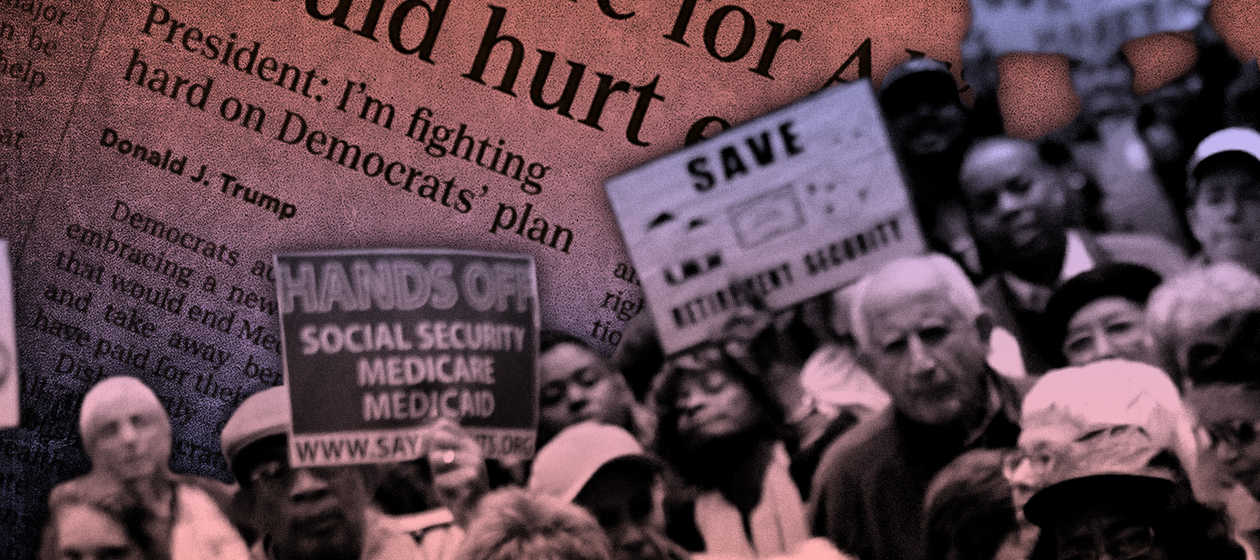Trump's bogus attack on Medicare-for-all
His stunningly disingenuous op-ed in USA Today reveals the true nature of conservatism


President Donald Trump took to the pages of USA Today on Wednesday to gin up fear among senior citizens about nascent proposals by some progressives to open up Medicare to all Americans. Nearly every sentence of Trump's screed was overrun with egregious factual inaccuracies and tired old tropes about "socialized medicine" turning the United States into a Latin American basket case.
But setting all that aside, Trump's op-ed reveals the core of modern conservatism: It's all about preserving privileges and dignity for those who already have them, and denying them to those who don't.
The heavy-handed message from Trump's op-ed is that seniors should fear giving Democrats political power because Democrats want to "end Medicare as we know it." Expanding our current Medicare-for-retirees program to a Medicare-for-all program, Trump asserts, would somehow endanger health care for current Medicare beneficiaries.
The Week
Escape your echo chamber. Get the facts behind the news, plus analysis from multiple perspectives.

Sign up for The Week's Free Newsletters
From our morning news briefing to a weekly Good News Newsletter, get the best of The Week delivered directly to your inbox.
From our morning news briefing to a weekly Good News Newsletter, get the best of The Week delivered directly to your inbox.
Trump's argument is a restatement of Republican talking points. As The Washington Post's Dave Weigel points out, Republican congressional candidates in competitive races across the country are purporting to be the true protectors of Medicare against imagined left-wing schemes to bankrupt health care for seniors. As Weigel characterizes the attack: "It's a zero-sum game, Republicans say, and Democrats want Medicare recipients to lose their benefits."
These attacks are dripping in bad faith. The Republican Party is supposedly the party of small-government conservatism, opposed in its bones to the very existence of government programs like Medicare. It's the party of Ronald Reagan, who warned that guaranteed health care for seniors would extinguish freedom in America, and the party of Paul Ryan, who spent his career dreaming of gutting Medicare through mass privatization and benefit cuts.
But that tradition is the conservatism of the Republican donor class. The movement's true id — the thing that actually moves its voters — is a conservatism that's all about protecting what's mine.
The zero-sum conviction — that your freedom and security comes at the expense of mine — goes to the heart of conservatism. In The Reactionary Mind, political science professor Corey Robin explores three centuries' worth of conservative thought. He concludes that conservative politics is ultimately all about preserving existing hierarchy. "Though it is often claimed that the left stands for equality while the right stands for freedom," Robin writes, "this notion misstates the actual disagreement between the right and left. [...] What the conservative sees and dislikes in equality is not a threat to freedom but its extension. For in that extension, he sees a loss of his own freedom."
A free daily email with the biggest news stories of the day – and the best features from TheWeek.com
Conservatives look out for those who might have something to lose from a more equal society, rather than those who have everything to gain. They fear that greater equality tomorrow will come at the expense of today's winners; that Medicare-for-all will be a drag on "our great seniors," as Trump baselessly warns. A stunningly disingenuous argument, no doubt. But it's the brand of conservatism — a kind of domestic welfare chauvinism — that will activate voters to cast their ballots based on fear.
Recall the apocryphal Tea Party-era demonstrators during the passage of the Affordable Care Act who hollered "Keep government out of my Medicare." Progressives roundly guffawed at the oblivious anti-Big Government protesters who didn't realize they were firmly on the dole of a Big Government health-care program. But through another lens, "Keep government out of my Medicare" was an inartful way of saying "Keep everyone else out of my Medicare." Progressive government means more equality, which to some, triggers fear of potential loss. The Tea Party's cry was against the encroachments of equality on hierarchy and power, not the literal overreach of liberal government.
A decade later, that health-care NIMBYism is now being repurposed in the last-ditch midterm pitch being made by Trump and congressional Republicans. It's a wholly absurd argument on its face — seniors would benefit immensely under Medicare-for-all. Sen. Bernie Sanders' (I-Vt.) bill would make Medicare a much more generous program by eliminating copays and deductibles and providing comprehensive coverage including dental, vision, and hearing care. There are valid concerns about the practicalities of enacting Medicare-for-all or its various offshoots. But seniors taking a net loss isn't one of them.
But none of this is about facts, anyway, so much as gut-level fear of loss and willingness to exclude. Trump closes his USA Today diatribe by pivoting to his bread and butter: anti-immigrant nativism. He accuses Democrats of wanting "open-borders socialism." His pairing of the two issues — immigration and the welfare state — is oddly appropriate. Just as he wants to build a wall along the Southern border to keep out immigrants seeking a better life, Trump now wants to wall off Medicare to keep working Americans from a more humane existence.
This isn't just some Trumpian obsession. Building walls is the essence of conservatism — a movement centered around making sure the haves keeping having, and the have-nots stay without. Trump's fact-free fear-mongering about Medicare-for-all just gives away the game.
Joel Dodge writes about politics, law, and domestic policy for The Week and at his blog. He is a member of the Boston University School of Law's class of 2014.
-
 Homes by renowned architects
Homes by renowned architectsFeature Featuring a Leonard Willeke Tudor Revival in Detroit and modern John Storyk design in Woodstock
-
 Looming drone ban has farmers and farm-state Republicans anxious
Looming drone ban has farmers and farm-state Republicans anxiousIN THE SPOTLIGHT As congressional China-hawks work to limit commercial drone sales from Beijing, a growing number of conservative lawmakers are sounding an agricultural alarm
-
 Mind-expanding podcasts you may have missed this fall
Mind-expanding podcasts you may have missed this fallThe Week Recommends True crime, a book club and a therapeutic outlet led this season’s best podcasts
-
 Has Zohran Mamdani shown the Democrats how to win again?
Has Zohran Mamdani shown the Democrats how to win again?Today’s Big Question New York City mayoral election touted as victory for left-wing populists but moderate centrist wins elsewhere present more complex path for Democratic Party
-
 Millions turn out for anti-Trump ‘No Kings’ rallies
Millions turn out for anti-Trump ‘No Kings’ ralliesSpeed Read An estimated 7 million people participated, 2 million more than at the first ‘No Kings’ protest in June
-
 Ghislaine Maxwell: angling for a Trump pardon
Ghislaine Maxwell: angling for a Trump pardonTalking Point Convicted sex trafficker's testimony could shed new light on president's links to Jeffrey Epstein
-
 The last words and final moments of 40 presidents
The last words and final moments of 40 presidentsThe Explainer Some are eloquent quotes worthy of the holders of the highest office in the nation, and others... aren't
-
 The JFK files: the truth at last?
The JFK files: the truth at last?In The Spotlight More than 64,000 previously classified documents relating the 1963 assassination of John F. Kennedy have been released by the Trump administration
-
 'Seriously, not literally': how should the world take Donald Trump?
'Seriously, not literally': how should the world take Donald Trump?Today's big question White House rhetoric and reality look likely to become increasingly blurred
-
 Will Trump's 'madman' strategy pay off?
Will Trump's 'madman' strategy pay off?Today's Big Question Incoming US president likes to seem unpredictable but, this time round, world leaders could be wise to his playbook
-
 Democrats vs. Republicans: who are US billionaires backing?
Democrats vs. Republicans: who are US billionaires backing?The Explainer Younger tech titans join 'boys' club throwing money and support' behind President Trump, while older plutocrats quietly rebuke new administration
